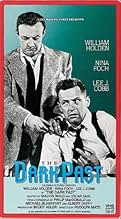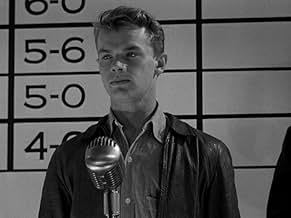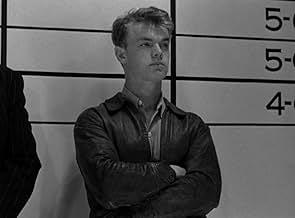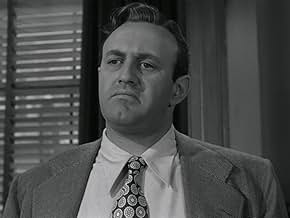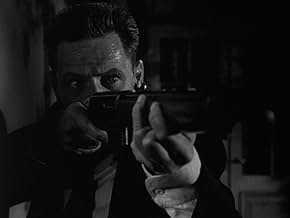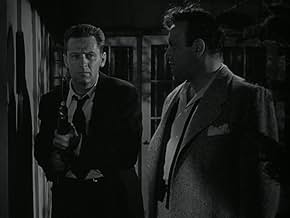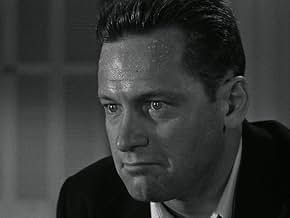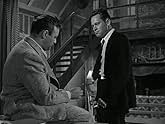CALIFICACIÓN DE IMDb
6.3/10
2.4 k
TU CALIFICACIÓN
Agrega una trama en tu idiomaAn escaped psychopathic killer who takes the family and neighbors of police psychologist hostage reveals a recurring nightmare to the doctor.An escaped psychopathic killer who takes the family and neighbors of police psychologist hostage reveals a recurring nightmare to the doctor.An escaped psychopathic killer who takes the family and neighbors of police psychologist hostage reveals a recurring nightmare to the doctor.
- Dirección
- Guionistas
- Elenco
- Premios
- 2 premios ganados en total
Charles Cane
- Sheriff
- (sin créditos)
Bill Cartledge
- Arrested Man Leaving Wagon
- (sin créditos)
Tom Coleman
- Detective
- (sin créditos)
G. Pat Collins
- Al's Father
- (sin créditos)
Ellen Corby
- Agnes
- (sin créditos)
Lester Dorr
- First Man in Police Line-Up
- (sin créditos)
Edward Earle
- McCoy
- (sin créditos)
Opiniones destacadas
The Dark Past is directed by Rudolph Maté and adapted by Malvin Wald, Oscar Saul, Philip MacDonald, Michael Blankfort and Albert Duffy from the play Blind Alley written by James Warwick. It stars William Holden, Nina Foch, Lee J. Cobb, Adele Jergens, Stephen Dunne and Lois Maxwell. Music is by George Duning and cinematography by Joseph Walker.
Al Walker Breaks Jail!
One from a number of classic era Hollywood's ventures into Freudian thrillers. Here we have Holden as escaped convict Al Walker, who along with his loyal crew hold hostage psychologist Dr. Andrew Collins (Cobb) and his guests at the doctor's remote country retreat. With Walker clearly unstable of mind and often showing a cold blooded streak, the good doctor, the calmest man in the house, slowly tries to draw out of Walker the root of his murderous leanings.
James Warwick's play had already had a film adaptation in 1939 as Blind Alley (Charles Vidor), but such was the advent of film noir and crime films of similar ilk, the source material was ripe for a remake in the late 40s. Maté's film is doubly reliant on strong acting performances and strength of subject matter, the former is no problem at all, with Cobb methodically excellent, Holden twitchy and coiled spring like and Foch smooth foil for both of them.
The latter issue isn't totally successful, though, the picture is very talky anyway, but much of the psycho-babble talk about conscious states, dreams, sensor bands and damage childhoods is handled so matter of fact, it's never really convincing as narrative thrust and it slow builds to a finale that lacks dramatic oomph. It's annoying really because Maté paints it in light and shade and a dream sequence, stripped back to negative form, is surreal excellence and befitting the interesting core basics of the psychological issues on the page.
It's definitely worth a look by those interested in the Freud influenced entries in the film noir cycle, while fans of hostage dramas like The Desperate Hours and The Petrified Forest will enjoy the character dynamics on show. But it's not all it can be and the handling of the crime and mental health equation is just too short changed to matter. 6.5/10
Al Walker Breaks Jail!
One from a number of classic era Hollywood's ventures into Freudian thrillers. Here we have Holden as escaped convict Al Walker, who along with his loyal crew hold hostage psychologist Dr. Andrew Collins (Cobb) and his guests at the doctor's remote country retreat. With Walker clearly unstable of mind and often showing a cold blooded streak, the good doctor, the calmest man in the house, slowly tries to draw out of Walker the root of his murderous leanings.
James Warwick's play had already had a film adaptation in 1939 as Blind Alley (Charles Vidor), but such was the advent of film noir and crime films of similar ilk, the source material was ripe for a remake in the late 40s. Maté's film is doubly reliant on strong acting performances and strength of subject matter, the former is no problem at all, with Cobb methodically excellent, Holden twitchy and coiled spring like and Foch smooth foil for both of them.
The latter issue isn't totally successful, though, the picture is very talky anyway, but much of the psycho-babble talk about conscious states, dreams, sensor bands and damage childhoods is handled so matter of fact, it's never really convincing as narrative thrust and it slow builds to a finale that lacks dramatic oomph. It's annoying really because Maté paints it in light and shade and a dream sequence, stripped back to negative form, is surreal excellence and befitting the interesting core basics of the psychological issues on the page.
It's definitely worth a look by those interested in the Freud influenced entries in the film noir cycle, while fans of hostage dramas like The Desperate Hours and The Petrified Forest will enjoy the character dynamics on show. But it's not all it can be and the handling of the crime and mental health equation is just too short changed to matter. 6.5/10
On a night I couldn't sleep, I came across this movie on the TV set by chance. The house of a psychiatrist is held hostage by an escaped prisoner and his entourage. The prisoner (william holden) battles his mental demons throughout the night while the psychiatrist is intrigued to discover why this man has become the "bad egg" he is today. The dialogue between them both is intriguing, with the psychiatrist trying to enter the escaped prisoner's mind and explain the dream this man has had since childhood. A good movie to watch on a rainy day. One particularly for the crime/noir buffs.
As others have mentioned the new psychology era and traumatic war experiences had been analyzed to death even by 1948. However the performances make this well worth watching this seldom televised film.
William Holden is very believable as a tormented gangster. He hijacks a dinner party in the doctor's (Lee J. Cobb) hunting lodge. Basically the theme is routine, we have seen "Suddenly" and other similar films with people held hostage. Lee J. Cobb is again excellent as a psychiatrist probing the past of the criminal (Holden) why, what causes this behavior?.
My generation is just re-discovering actors such as Holden. It is unfortunate some cable companies STILL do not broadcast these films (Turner Classics is a must, for me anyway).
Nina Foch is also very good as Holden's girlfriend, attempting to help. Her fine performance contrasts with the two women servants tied in the basement,one screaming shrilly and seeming ridiculous.
I liked this better than "Spellbound"; this is a bit more pedestrian but true to life. It is easier to believe Lee J. Cobb as a psychiatrist (he was also the redeeming performance in the film "The Three Faces of Eve" also starring Joanne Woodward). Recommended for anyone who likes suspense and psychological drama. 8/10.
William Holden is very believable as a tormented gangster. He hijacks a dinner party in the doctor's (Lee J. Cobb) hunting lodge. Basically the theme is routine, we have seen "Suddenly" and other similar films with people held hostage. Lee J. Cobb is again excellent as a psychiatrist probing the past of the criminal (Holden) why, what causes this behavior?.
My generation is just re-discovering actors such as Holden. It is unfortunate some cable companies STILL do not broadcast these films (Turner Classics is a must, for me anyway).
Nina Foch is also very good as Holden's girlfriend, attempting to help. Her fine performance contrasts with the two women servants tied in the basement,one screaming shrilly and seeming ridiculous.
I liked this better than "Spellbound"; this is a bit more pedestrian but true to life. It is easier to believe Lee J. Cobb as a psychiatrist (he was also the redeeming performance in the film "The Three Faces of Eve" also starring Joanne Woodward). Recommended for anyone who likes suspense and psychological drama. 8/10.
Lee J. Cobb is a psychiatrist who works to discover "The Dark Past" of convict William Holden in this 1948 drama that also stars Nina Foch and Adele Jurgens. Two of Hollywood's favorite subject matters are part of the film plot: The post-war obsession with psychiatry and a hostage situation, of which there have been many in films over the years. Like Bogart in "The Desperate Hours," Holden's an escaped convict with a gang that holes up in someone's home while waiting for a ride that doesn't arrive when it's supposed to. And, like the later "Desperate Hours," the couple has a child that tries to escape. In "The Desperate Hours," you wanted to kill the kid; at least here, he doesn't cause as much trouble.
Psychiatry in America was really just being explored in film, and it was as a result of the trauma soldiers suffered in World War II and the problems they had when they came home. The script is simplistic and dated, but the performances are good. Holden is terrific as the on-the-edge convict tortured by partial hand paralysis and a recurring nightmare from an incident in his childhood; young, pretty Nina Foch is his girlfriend who loves him but is terribly hurt by his actions. When I was growing up, the striking Foch was in her forties and a constant presence in television, usually playing a neurotic mess. She still acts and is a very prominent drama teacher in Los Angeles. It was wonderful to see her in these early days - she made a fine ingénue. Cobb is convincing as a psychiatrist who keeps his cool as he tries to help the young man.
After William Holden's big splash at the age of 21 in "Golden Boy" in 1939, his career settled into a series of light leading man roles that took him nowhere. Superstardom didn't hit until 1950's Sunset Boulevard. One of the comments on IMDb remarked that in "Golden Boy," he looked like Tom Hanks, which stuck in my mind as I was watching "The Dark Past." Well, it's the strangest version of separated at birth that I've ever seen, but there is the oddest resemblance between these two stars. Here, with his hairline exposed, you can really see the similarity in the shape of Holden's face to Hanks', and there's even a similarity in profile and around the eyes. You'd never catch it unless someone mentioned it to you or you've seen "Golden Boy" where Holden is nearly unrecognizable - and then once you pick it up, it's totally distracting.
The other odd thing about this film which says something about our society today is that these people were getting together for a casual evening in a country home and they were all dressed to the nines - even the criminals were wearing suits and ties! Times sure have changed. Despite this and other dated elements of "The Dark Past," William Holden, a tremendous star, is always worth a look.
Psychiatry in America was really just being explored in film, and it was as a result of the trauma soldiers suffered in World War II and the problems they had when they came home. The script is simplistic and dated, but the performances are good. Holden is terrific as the on-the-edge convict tortured by partial hand paralysis and a recurring nightmare from an incident in his childhood; young, pretty Nina Foch is his girlfriend who loves him but is terribly hurt by his actions. When I was growing up, the striking Foch was in her forties and a constant presence in television, usually playing a neurotic mess. She still acts and is a very prominent drama teacher in Los Angeles. It was wonderful to see her in these early days - she made a fine ingénue. Cobb is convincing as a psychiatrist who keeps his cool as he tries to help the young man.
After William Holden's big splash at the age of 21 in "Golden Boy" in 1939, his career settled into a series of light leading man roles that took him nowhere. Superstardom didn't hit until 1950's Sunset Boulevard. One of the comments on IMDb remarked that in "Golden Boy," he looked like Tom Hanks, which stuck in my mind as I was watching "The Dark Past." Well, it's the strangest version of separated at birth that I've ever seen, but there is the oddest resemblance between these two stars. Here, with his hairline exposed, you can really see the similarity in the shape of Holden's face to Hanks', and there's even a similarity in profile and around the eyes. You'd never catch it unless someone mentioned it to you or you've seen "Golden Boy" where Holden is nearly unrecognizable - and then once you pick it up, it's totally distracting.
The other odd thing about this film which says something about our society today is that these people were getting together for a casual evening in a country home and they were all dressed to the nines - even the criminals were wearing suits and ties! Times sure have changed. Despite this and other dated elements of "The Dark Past," William Holden, a tremendous star, is always worth a look.
I have always liked William Holden: handsome, restrained acting, penetrating eyes. In this particular film, he is actually bested by Lee J Cobb, very effective and convincing as the smooth psychiatrist.
Mate's direction is OK. It keeps you watching this unconvincing story but fails to raise production above overall mediocrity. Photography is probably satisfactory for a B noir... but I find it unfair to rate B a flick with a cast of this quality. Ultimately disappointing. 5/10.
Mate's direction is OK. It keeps you watching this unconvincing story but fails to raise production above overall mediocrity. Photography is probably satisfactory for a B noir... but I find it unfair to rate B a flick with a cast of this quality. Ultimately disappointing. 5/10.
¿Sabías que…?
- TriviaThe re-creation of Al's dream uses a few seconds of footage from Blind Alley (1939), the earlier film version of this story; specifically the shot approaching the saloon, panning to see the policemen following the narrator, and panning back to the saloon side entrance.
- ErroresAl takes a book off of Andrew's book shelf and opens it around page 50 or 60, but in the next closeup, the page Al is looking at the start of Chapter 22. It's highly unlikely that a scholarly book about psychology would average under three pages per chapter.
- ConexionesReferenced in Discovering Film: William Holden (2015)
Selecciones populares
Inicia sesión para calificar y agrega a la lista de videos para obtener recomendaciones personalizadas
- How long is The Dark Past?Con tecnología de Alexa
Detalles
- Tiempo de ejecución1 hora 13 minutos
- Color
- Relación de aspecto
- 1.37 : 1
Contribuir a esta página
Sugiere una edición o agrega el contenido que falta

Principales brechas de datos
By what name was Pasión de odio (1948) officially released in India in English?
Responda
